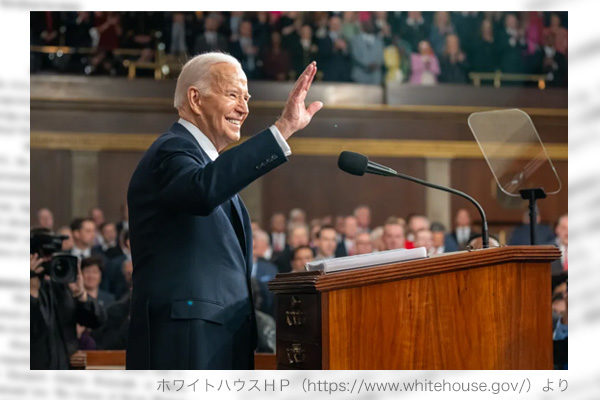U.S. President Joe Biden in his State of the Union address on March 7 warned that freedom and democracy are “under attack both at home and abroad at the very same time,” making a strong call for support for Ukraine. Given that the domination of aggressor Russia in Ukraine will encourage China to change the status quo by force, support for Ukraine is in line with Japan’s national interests. I hope that the U.S. Congress will pass additional support for Ukraine before the March 17 Russian presidential election in order not to please Russian President Vladimir Putin any more, as urged by Biden.
Biden urged Congress in his State of the Union address
While it is usual for the State of the Union address to start with economic measures in which voters are highly interested, Biden took an aggressive stance from the outset, targeting the Congressional Republicans and the public who are reluctant to provide additional aid to Ukraine, saying that his purpose was to “wake up the Congress and alert the American people.” He echoed former President Franklin D. Roosevelt’s call for Congress and the public in his State of the Union address in January 1941 to prevent dictator Hitler from dominating Europe in World War II.
Regarding a domestic crisis, Biden said, “Not since President Lincoln and the Civil War have freedom and democracy been under assault at home as they are today,” blaming his predecessor Donald Trump for having invited rioters’ assault on the Capitol on January 6, 2021. Biden might have meant the United States is confronting a more dangerous threat than hardship that faced Roosevelt or Lincoln.
Biden made a campaign-style State of the Union address in apparent response to some who wondered if the 81-year-old president could deliver a convincing speech. By condemning Trump throughout the address, he emphasized his forcefulness. Biden specifically stressed that Putin’s aggression will not stop at Ukraine, but will spread to wider Europe and endanger the free world. He blamed Trump for making a remark that can be interpreted as encouraging Putin to invade North Atlantic Treaty Organization members with low defense spending, Biden vowed not to walk away from Ukraine and the NATO in an apparent bid to discourage Russia.
Biden reaffirmed that what Ukraine is seeking is U.S. military support for fighting against Russia, rather than U.S. troops. U.S. support for Ukraine necessary to block the Russian invasion is estimated at just 5-6% of U.S. defense spending, and it is noted that the goal can be achieved even without mobilizing a single U.S. soldier. Moreover, the U.S. military support has a deterrent effect on other potential aggressors such as China. It is a low-cost option.
Japan should expand indirect military support
The National Security Strategy adopted by the Japanese government also expresses a sense of vigilance. It recognizes that Russia’s aggression against Ukraine has disrupted the international order and a similar development may come in the Indo-Pacific region, particularly East Asia. As Japanese Prime Minister Fumio Kishida put it, “Today’s Ukraine is tomorrow’s East Asia.” The Kishida government has made it possible for Japan to increase licensed production of PAC-2 surface-to-air missiles and export them to the United States in operating the three principles for defense equipment transfer. Such exports will make up for U.S. PAC-2 stockpiles that has declined due to its support for Ukraine, serving as Japan’s indirect military support for Ukraine. We would like to see the expansion of such indirect support to cover ammunition and other items.
Hiroshi Yuasa is a Planning Committee member and a senior fellow at the Japan Institute for National Fundamentals. He is also a columnist for the Sankei Shimbun newspaper.


